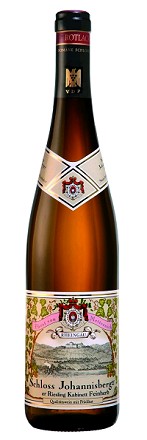| Some 1,200 years of viticultural history are associated with Johannisberg. An eventful history, which, among other things, led to the creation of the world’s first Riesling wine estate and with it, a unique wine culture that has existed at Johannisberg ever since. Founded as a Benedictine monastery, the Johannisberg abbey quickly became a viticultural focal point and initiator in the Rheingau. Today, in the heart of the cellar, is the underground library “Bibliotheca subterranea” – the famed treasure chamber of the palace, with its centuries-old wine rarities. As of 1716, Schloss Johannisberg belonged to the prince abbot of Fulda, who had a grand, three-winged palace built in line with the taste of the times. It is thanks to this owner that the benefits of a “Spätlese” (late harvest) were recognized. In 1775, the courier annually sent to Fulda to receive official permission for the start of the grape harvest was delayed by several weeks. By the time he returned to Johannisberg, the grapes were infested with noble rot. Nevertheless, the courageous cellarmaster had the rotten grapes harvested and vinified, thereby producing a new style of ?wine – “Spätlese” – which thereafter became standard at Johannisberg. Although documents from 1730 report that a few growers “gladly waited for a bit of noble rot in order to increase the sugar level of the grapes,” the year 1775 marked the beginning of a deliberately scheduled late harvest of botrytized grapes. A monument adjacent to the Vinothek (wine shop), where the estate’s current vintages can be sampled, commemorates the famous courier whose delay led to the worldwide triumphal course of “Spätlese”. In 1816, in the wake of Napoleon’s secularization of church properties and the ensuing joint administration by Prussia, Russia and Austria, the palace was ceded to the state chancellor of the Austrian emperor, Clemens Wenzel Lothar Fürst von Metternich, for his service at the Congress of Vienna the year before. However, to this day, one tenth of the annual harvest must be delivered to the House of Habsburg or its legal successors. The influential Metternich admitted: “I enjoy a peacefulness here that I regard as a blessing, and this pleasure is due to the character of the region. ” In 1942, the palace was hit by bombs and burned down. It was thanks to Fürstin Tatiana and her husband, Paul Alfons Fürst von Metternich, that the impressive palace and grounds were restored to their former glory by 1965. The grande dame, who, above all, was actively engaged in the promotion of culture in the Rheingau and many other causes, lived at Schloss Johannis-berg until her death in July 2006. Wine culture at Schloss Johannisberg has outlived the many storms of the past. Riesling is truly at home here. The estate is well aware that the historical past brings with it a responsibility in the future – with every new vintage, Johannisberg strives to carry on this unique Riesling culture. |





 0
0



